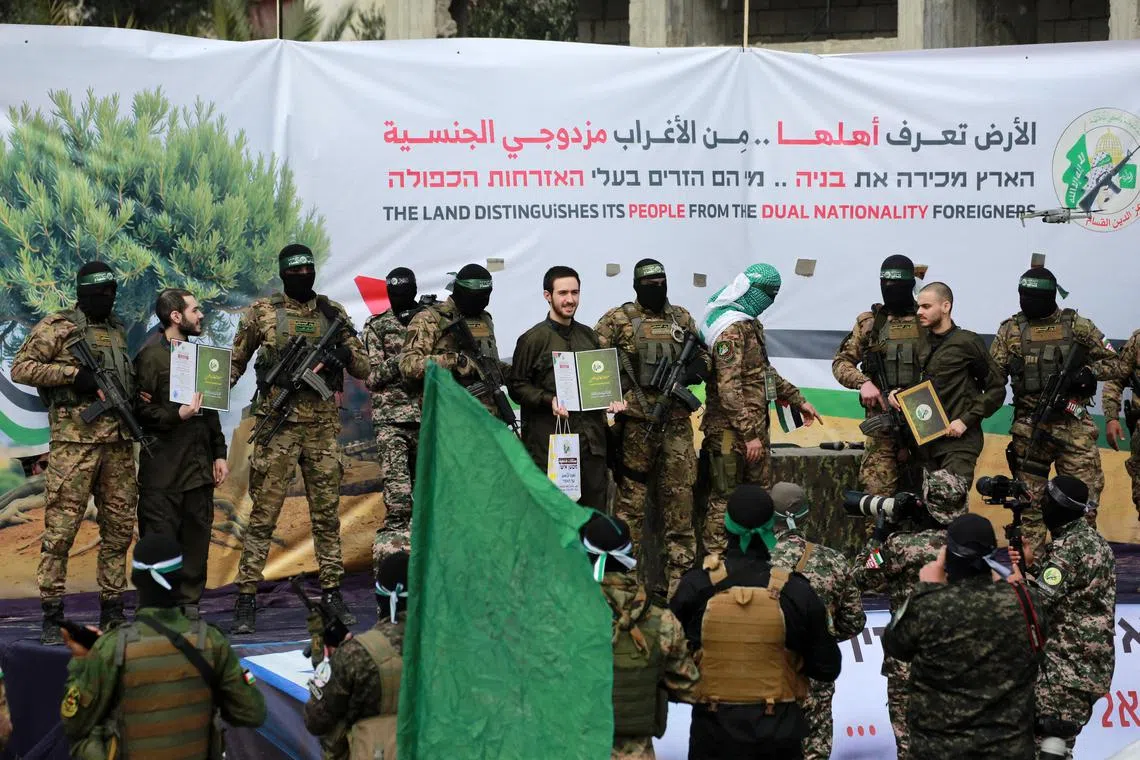Hamas says Gaza truce gravely endangered after Israel’s prisoner-release delay
Sign up now: Get ST's newsletters delivered to your inbox

Hamas militants parade newly-released Israeli hostages - (from left) Mr Eliya Cohen, Mr Omer Shem Tov and Mr Omer Wenkert - on stage in Nuseirat in the central Gaza Strip.
PHOTO: AFP
Follow topic:
GAZA STRIP – Hamas on Feb 23 said Israel has gravely endangered a five-week-old Gaza truce by delaying a release of Palestinian prisoners under the deal because of the manner in which it has freed Israeli hostages.
The first phase of the truce ends early in March and details of a planned subsequent phase have not been agreed upon.
With tensions again hanging over the deal – which halted more than 15 months of war – Israel on Feb 23 announced an expansion of military operations in the occupied West Bank.
The military said a tank division will be sent in to the West Bank city of Jenin, the first such deployment to the territory in 20 years.
Since the Gaza ceasefire’s first phase began on Jan 19, Hamas has released 25 living Israeli hostages in ceremonies before crowds at various locations in Gaza.
Armed and masked fighters had escorted the captives onto stages adorned with slogans. The hostages had spoken and waved in what Israeli Prime Minister Benjamin Netanyahu called “humiliating ceremonies”.
The Red Cross has previously appealed to all parties for the swops to be carried out in a “dignified and private” manner.
In the seventh such transfer, Hamas released six Israeli captives on Feb 22 but Israel put off the planned release of more than 600 Palestinian prisoners in exchange.
Senior Hamas official Basem Naim said postponing the release exposes “the entire agreement to grave danger”. He added that the mediators, “especially the Americans”, must pressure Israel’s government “to implement the agreement as it is and immediately release (their) prisoners”.
Both sides have accused each other of violations during the ceasefire but it has held up so far.
Israeli tanks in Jenin
Early on Feb 23, Mr Netanyahu’s office said “in light of Hamas’ repeated violations – including the disgraceful ceremonies that dishonour our hostages and the cynical use of hostages for propaganda – it has been decided to delay the release of terrorists”.
Israel vowed to destroy Hamas after its Oct 7, 2023, attack on Israel that triggered the Gaza war.
The Hamas attack resulted in the deaths of more than 1,200 people, and Israel’s retaliation has killed more than 48,000, according to figures from both sides.
The war drew in Iran-backed groups around the region, including in Lebanon where Israel in November 2024 reached a separate ceasefire with Hezbollah.
Alongside the Gaza war – which displaced almost the entire population of 2.4 million – violence has also soared in the West Bank.
On Feb 23, Israel’s military said “a tank division will operate in Jenin” as part of “expanding” operations in the area, where the military began a major raid against Palestinian militants just after the Gaza truce began.
The United Nations has said the military activities have led to the “forced displacement” of 40,000 Palestinians from Jenin and other refugee camps.
Defence Minister Israel Katz said he has told troops “to prepare for a prolonged presence in the cleared camps for the coming year and to prevent the return of residents and the resurgence of terrorism”.
In the West Bank, as well as in Gaza, families of Palestinian prisoners waited with uncertainty into the night on Feb 22. In the city of Khan Younis, Ms Umm Diya al-Agha, 80, said she received word her son is among those scheduled to be freed, after 33 years in prison.
“If my heart were made of iron, it would have melted and shattered. Every day, I have been waiting for this moment,” she said.
Parading of bodies
The six Israelis released on Feb 22 are the last group of living hostages to be freed under the truce’s first phase.
At a ceremony in Nuseirat, central Gaza, hostages Eliya Cohen, 27, Omer Shem Tov, 22, and Omer Wenkert, 23, an Israeli-Argentine, waved from a stage, flanked by masked Hamas militants, before they were transferred to the Red Cross.
“I saw the look on his face. He’s calm, he knows he’s coming back home... He’s a real hero,” said Mr Wenkert’s friend Rory Grosz.
In Rafah, southern Gaza, militants handed over Mr Tal Shoham, 40, and Mr Avera Mengistu, 38.
A sixth hostage, Mr Hisham al-Sayed, 37, was later released in private and taken back to Israeli territory, the military said.
Mr Sayed, a Bedouin Muslim, and Mr Mengistu, an Ethiopian Jew, had been held in Gaza for about a decade after they entered the territory individually.
Hamas said they freed Mr Sayed in private to “honour and respect” Palestinians inside Israel.
On Feb 20, the first transfer of dead hostages – it included two young children and their mother – under the truce sparked anger in Israel after analysis concluded that captive Shiri Bibas’ remains were not among the four bodies returned. UN human rights chief Volker Turk condemned the “parading of bodies” during a ceremony in which coffins, with pictures of the dead attached, were displayed on a slogan-bedecked stage.
Ms Bibas and her two young sons became symbols of Israel’s hostage ordeal.
Hamas admitted a possible “mix-up of bodies”, and handed over more human remains on Feb 21, which the Bibas family said had been identified as that of the mother.
Hamas has long maintained that an Israeli air strike killed Ms Bibas and her sons.
Forensics expert Chen Kugel, however, said an autopsy of their remains found “no evidence of injuries caused by a bombing”. AFP

